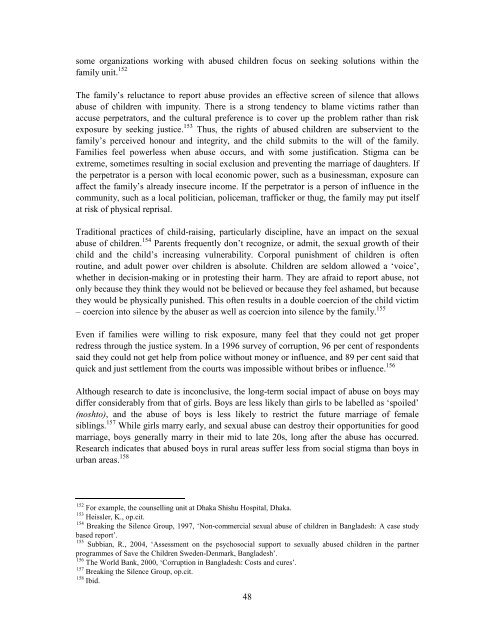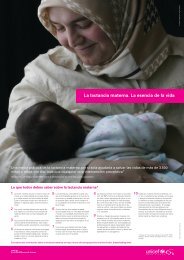SEXUAL ABUSE AND EXPLOITATION OF BOYS IN SOUTH ASIA A ...
SEXUAL ABUSE AND EXPLOITATION OF BOYS IN SOUTH ASIA A ...
SEXUAL ABUSE AND EXPLOITATION OF BOYS IN SOUTH ASIA A ...
You also want an ePaper? Increase the reach of your titles
YUMPU automatically turns print PDFs into web optimized ePapers that Google loves.
some organizations working with abused children focus on seeking solutions within the<br />
family unit. 152<br />
The family’s reluctance to report abuse provides an effective screen of silence that allows<br />
abuse of children with impunity. There is a strong tendency to blame victims rather than<br />
accuse perpetrators, and the cultural preference is to cover up the problem rather than risk<br />
exposure by seeking justice. 153 Thus, the rights of abused children are subservient to the<br />
family’s perceived honour and integrity, and the child submits to the will of the family.<br />
Families feel powerless when abuse occurs, and with some justification. Stigma can be<br />
extreme, sometimes resulting in social exclusion and preventing the marriage of daughters. If<br />
the perpetrator is a person with local economic power, such as a businessman, exposure can<br />
affect the family’s already insecure income. If the perpetrator is a person of influence in the<br />
community, such as a local politician, policeman, trafficker or thug, the family may put itself<br />
at risk of physical reprisal.<br />
Traditional practices of child-raising, particularly discipline, have an impact on the sexual<br />
abuse of children. 154 Parents frequently don’t recognize, or admit, the sexual growth of their<br />
child and the child’s increasing vulnerability. Corporal punishment of children is often<br />
routine, and adult power over children is absolute. Children are seldom allowed a ‘voice’,<br />
whether in decision-making or in protesting their harm. They are afraid to report abuse, not<br />
only because they think they would not be believed or because they feel ashamed, but because<br />
they would be physically punished. This often results in a double coercion of the child victim<br />
– coercion into silence by the abuser as well as coercion into silence by the family. 155<br />
Even if families were willing to risk exposure, many feel that they could not get proper<br />
redress through the justice system. In a 1996 survey of corruption, 96 per cent of respondents<br />
said they could not get help from police without money or influence, and 89 per cent said that<br />
quick and just settlement from the courts was impossible without bribes or influence. 156<br />
Although research to date is inconclusive, the long-term social impact of abuse on boys may<br />
differ considerably from that of girls. Boys are less likely than girls to be labelled as ‘spoiled’<br />
(noshto), and the abuse of boys is less likely to restrict the future marriage of female<br />
siblings. 157 While girls marry early, and sexual abuse can destroy their opportunities for good<br />
marriage, boys generally marry in their mid to late 20s, long after the abuse has occurred.<br />
Research indicates that abused boys in rural areas suffer less from social stigma than boys in<br />
urban areas. 158<br />
152<br />
For example, the counselling unit at Dhaka Shishu Hospital, Dhaka.<br />
153<br />
Heissler, K., op.cit.<br />
154<br />
Breaking the Silence Group, 1997, ‘Non-commercial sexual abuse of children in Bangladesh: A case study<br />
based report’.<br />
155<br />
Subbian, R., 2004, ‘Assessment on the psychosocial support to sexually abused children in the partner<br />
programmes of Save the Children Sweden-Denmark, Bangladesh’.<br />
156<br />
The World Bank, 2000, ‘Corruption in Bangladesh: Costs and cures’.<br />
157 Breaking the Silence Group, op.cit.<br />
158 Ibid.<br />
48










